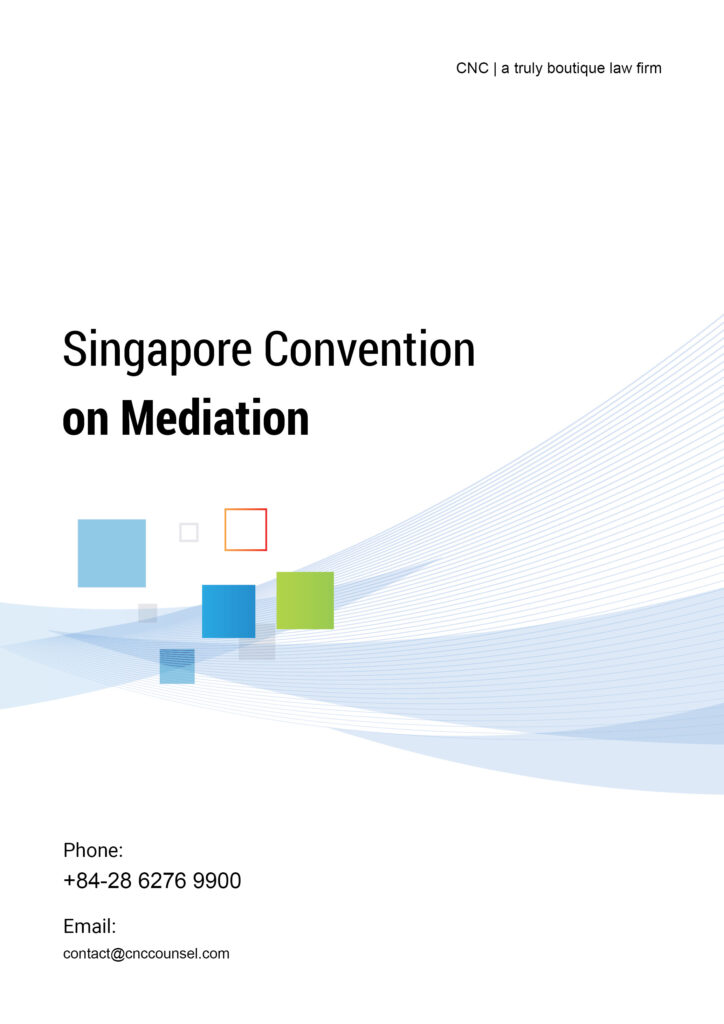The United Nations Convention on International Settlement Agreements Resulting from Mediation, which took effect on September 29, 2020 – aka: the Singapore Convention on Mediation – provides a consistent and efficient framework for the recognition and enforcement of mediated settlement agreements. This convention presented and provided ample opportunities, not only for the legal research community, but also for legal practitioners in Vietnam.
Therefore, in this article, CNC provides readers with an overview of the Singapore Convention on Mediation, as well as mediation agreements and support for the enforcement of mediated settlement agreements.
Download the PDF version of this article here: [pdf] Newsletter_Singapore Convention on Mediation
Provisions of Mediated Settlement Agreement
Definition
Article 2.3. Definition
Meditation: a process, irrespective of the expression used or the basis upon which the process is carried out, whereby parties diligently work together toward an amicable settlement of their dispute(s) with the assistance of a third person or persons (“the mediator”) lacking authority to impose a solution upon the parties of the dispute.
Mediation is a commercial dispute resolution method based on negotiations between the parties, in which the mediator serves as a neutral intermediary and facilitates the resolution process.
According to the Singapore Convention on Mediation, the outcome of the mediation depends entirely on the parties of the dispute, with the mediator providing guidance toward a mutual agreement. In other words, the parties maintain control throughout the dispute resolution process. This is a significant difference compared to other methods of alternative dispute resolution (“ADR”), such as commercial arbitration, where parties are bound by the decision of a third party.
Scope of Application
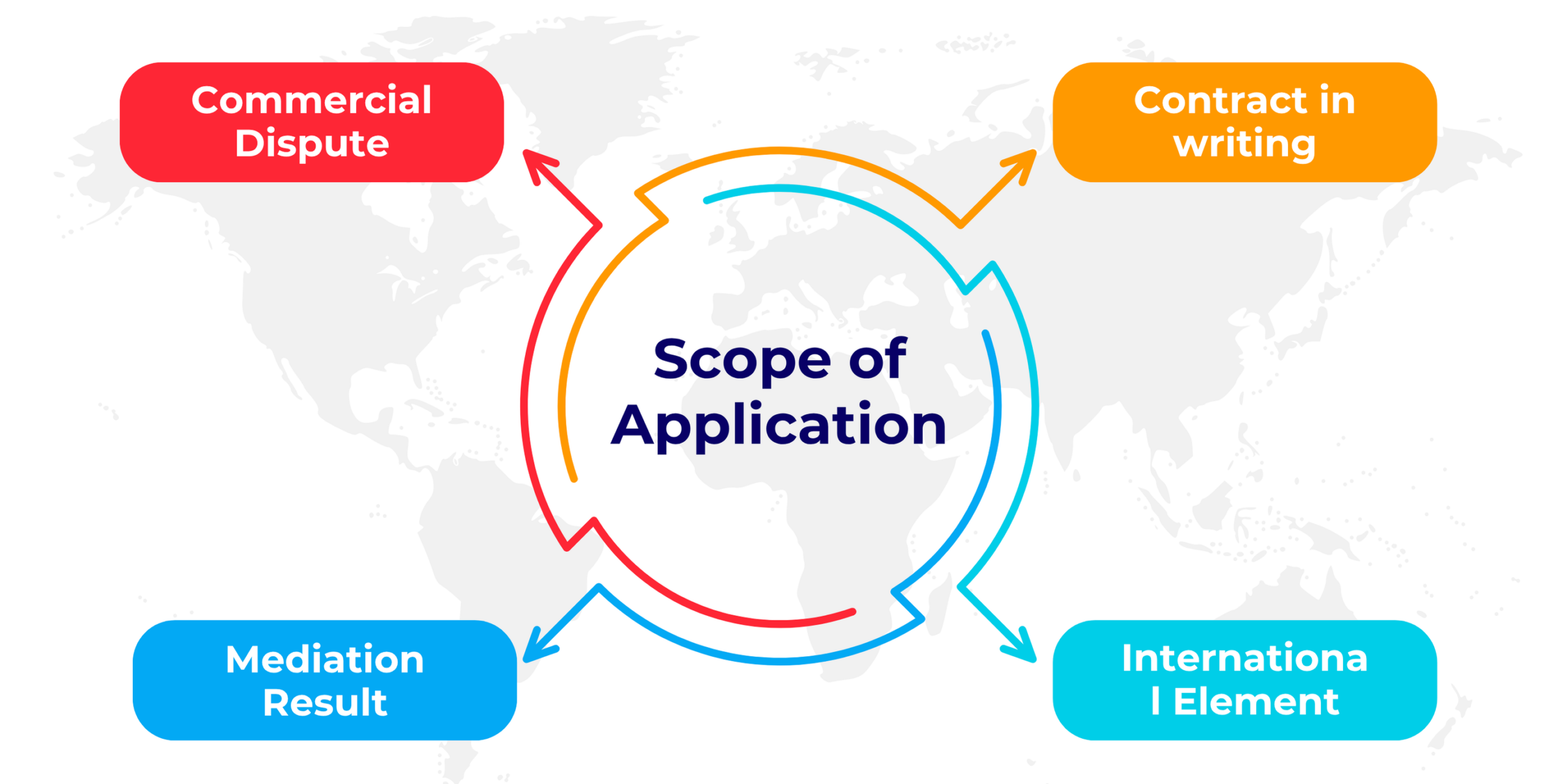
Singapore Convention on Mediation
Firstly, disputes to be resolved must be commercial disputes
Article 1.2. Scope of Application
This Convention does not apply to settlement agreements:
(a) Concluded to resolve a dispute arising from transactions engaged in by one of the parties (a consumer) for personal, family, or household purposes;
(b) Relating to family, inheritance, or employment law
The Singapore Convention on Mediation adopts an exclusionary approach to defining its scope of application, meaning it applies to all situations except those specifically excluded.
Therefore, the Singapore Convention on Mediation does not apply to disputes in which one of the parties is not engaged in commercial activities, such as disputes related to (i) family law, (ii) inheritance law, and (iii) employment law.
Secondly, it is only applicable to internationally mediated settlement agreements
Article 2.1. Definitions
For the purposes of Article 1, paragraph 1:
(a) If a party has more than one place of business, the relevant place of business is that which has the closest relationship to the dispute resolved by the settlement agreement, having regard to the circumstances known to, or contemplated by, the parties at the time of the conclusion of the settlement agreement;
(b) If a party does not have a place of business, reference is to be made to the party’s habitual residence.
According to the Singapore Convention on Mediation, a dispute resolution agreement with international elements may be determined from the business location of involved parties:
(i) For individuals, at least two of the parties to the agreement have their business location located in different countries.
(ii) For countries, parties who entered into agreements with countries must have their business location in a country other than (i) the country in which a significant part of the obligations are performed or (ii) the country to which the content of the agreement is most closely related.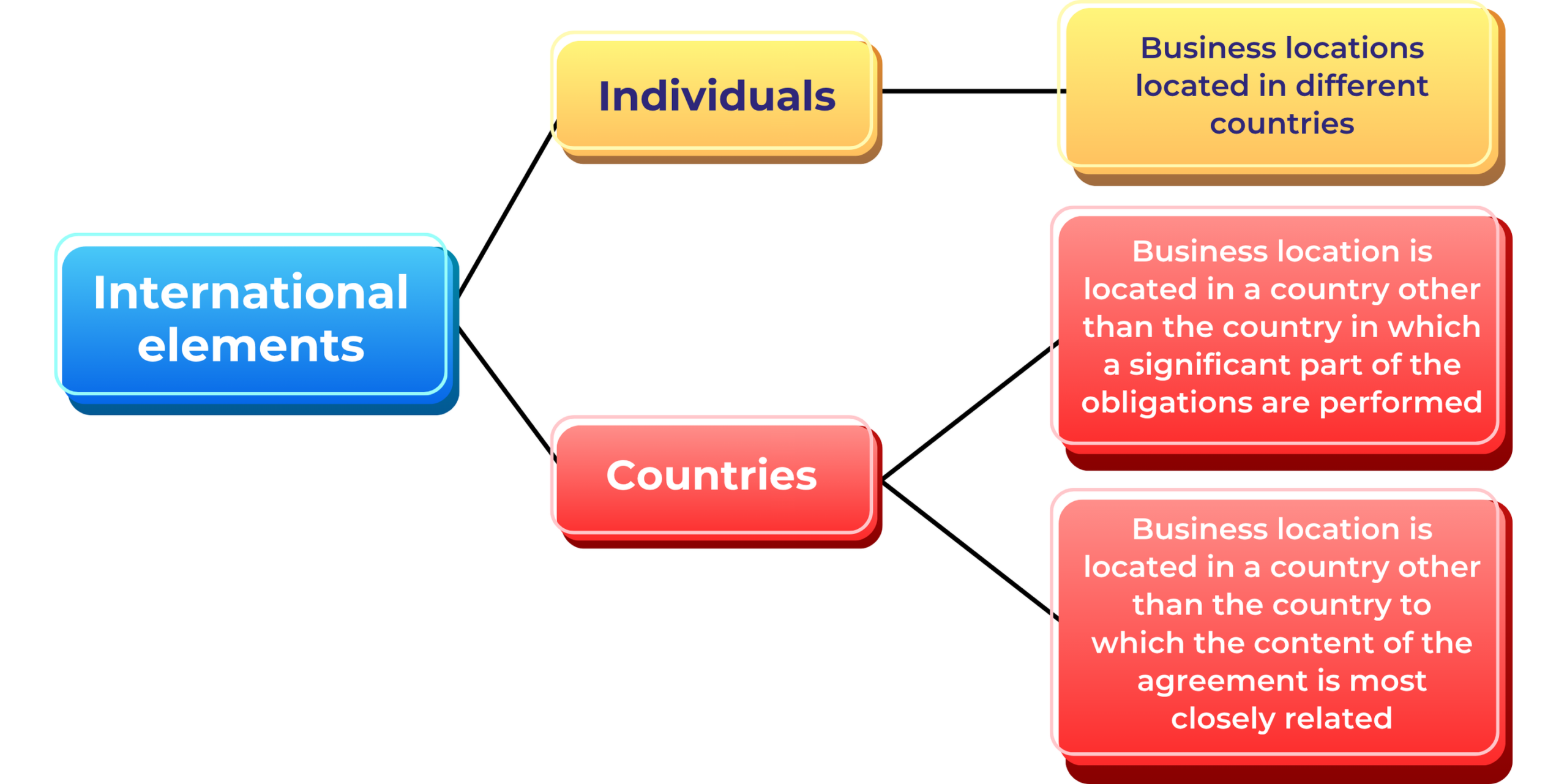
International elements for the Singapore Convention on Mediation to be applicable
Therefore, parties to agreements must partake in the international commercial environment to ensure that the agreement may be enacted per the regulation of international laws.
Thirdly, the mediated settlement agreements must be in writing
Article 2. Definitions
“A settlement agreement” is “in writing” if its content is recorded in any form. The requirement that a settlement agreement be in writing is met by an electronic communication if the information contained therein is accessible so as to be useable for subsequent reference.”
According to the aforementioned, a mediation agreement must be an agreement between the parties to the dispute, reflecting the mutual intention to engage in mediation for dispute resolution. This aligns with Vietnamese law, as Decree No. 22/2017/ND-CP also requires that “parties shall record their successful mediation in writing” once an agreement is reached.
However, the Singapore Convention on Mediation allows agreements to be established via electronic means, providing flexibility in response to technological advancements and prioritizing the parties’ desired outcome achieved through amicable resolution. In contrast, Decree No. 22/2017/ND-CP strictly requires agreements to be made in writing.
Finally, the settlement agreement must be the result of mediation
Parties shall, in their best effort and good faith, resolve the disputes with the facilitation of the mediator and complete the dispute resolution process. Therefore, different from jurisdictional methods of dispute resolution (litigation or arbitration), mediators are neutral third parties who have neither the power to make decisions on the dispute nor impose their will on the outcome of the mediation.
Moreover, considering the support and recommendations put forward by the mediator, the agreement between parties shall be different from the usual contract agreement.
Enforcement of Mediated Settlement Agreement: Comparison of Singapore Convention on Mediation and Decree No. 22/2017/ND-CP
In terms of wording, Singapore Convention on Mediation opts for the term “relief” instead of “recognition”. This is because the term “recognition” often refers to a state’s recognition of a public act by another state, such as court decisions. Meanwhile, a mediation agreement is a private agreement between parties, not a public act. As such, the Singapore Convention on Mediation does not directly use the term “recognition.”[1]
Regarding basis, Singapore Convention on Mediation and Decree No. 22/2017/ND-CP provides some general requirements, to be specific:
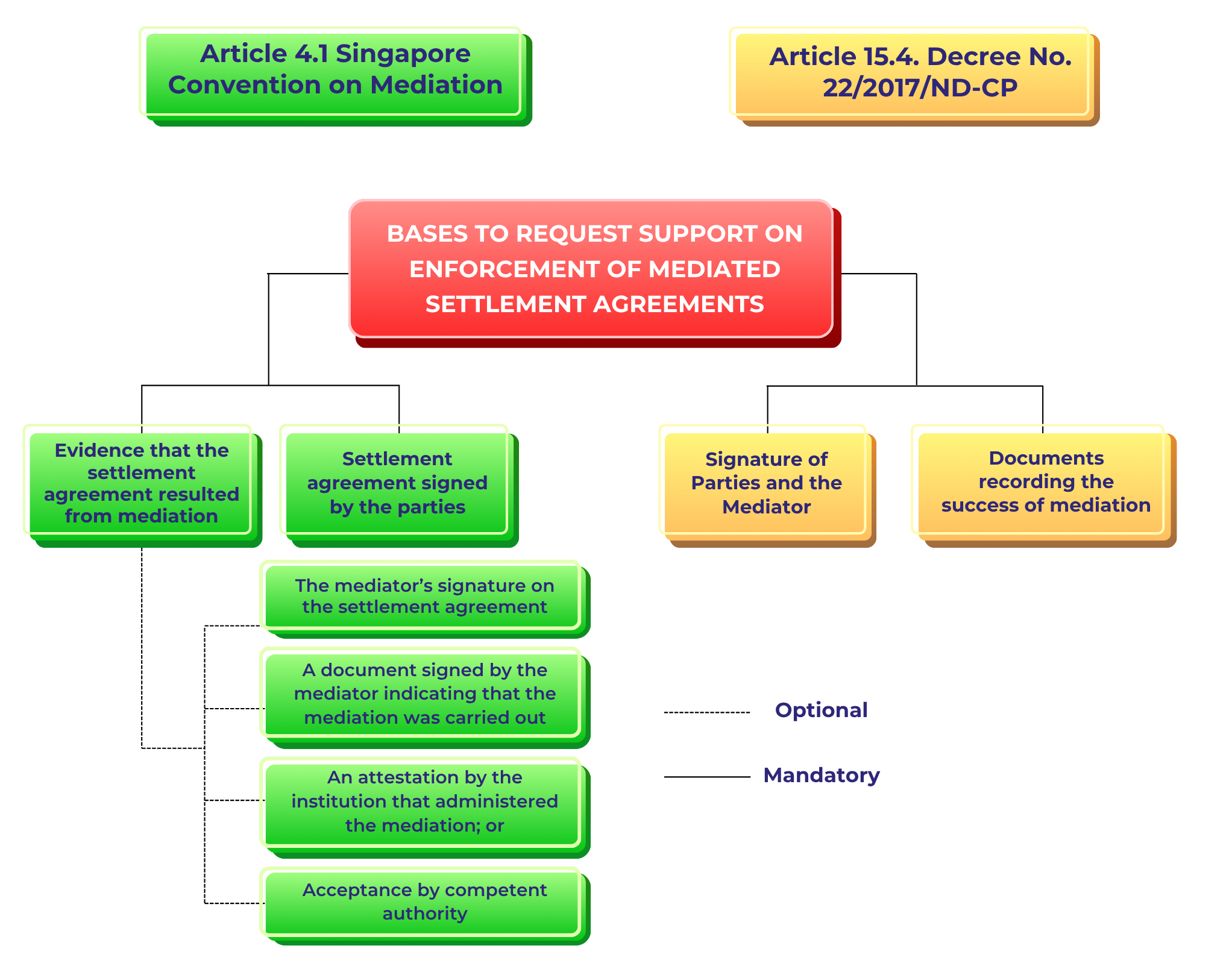
Different in bases to request for enforcement of mediated settlement agreement
Regarding evidence, the Singapore Convention on Mediation requires the party seeking relief to supply (i) the settlement agreement signed by the parties and (ii) Evidence that the settlement agreement resulted from mediation. Meanwhile, Decree No. 22/2017/ND-CP. Overall, the Convention allows for broader interpretation of what could be evidence, while Decree No.22/2017/ND-CP explicitly requires signatures as evidence.
Regarding the scope, the scope of recognition and enforcement in relation to commercial disputes in the Singapore Convention on Mediation is broader, compared to Decree No. 22/2017/ND-CP.
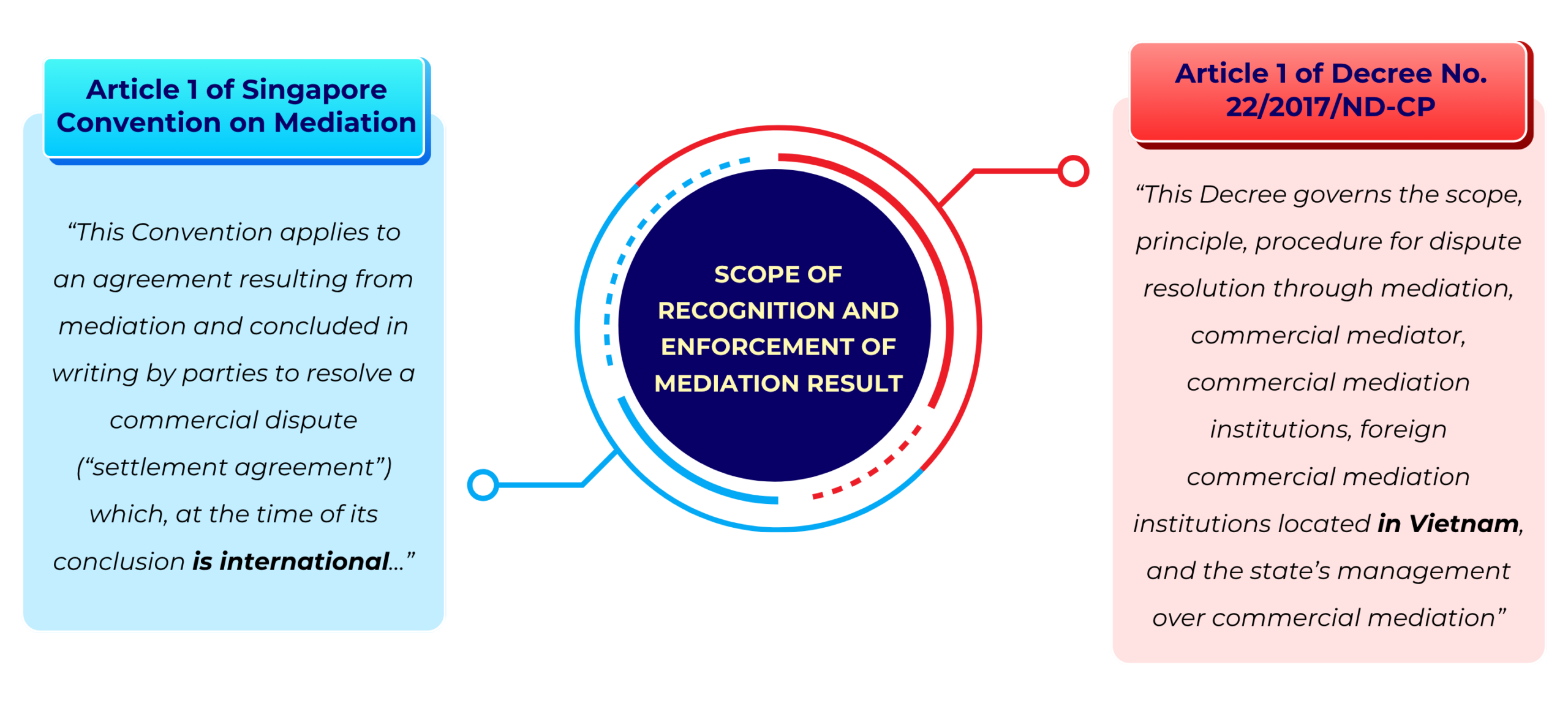
The difference in the scope of Recognition and Enforcement in relation to commercial disputes
Singapore Convention on Mediation mandates the enforcement of international mediated settlement agreements, with the international element being determined by the business location of parties at the time the agreedment is concluded. As for Decree No. 22/2017/ND-CP, the scope of application only encompasses domestic mediation results. Therefore, for international commercial disputes, Decree No. 22/2017/ND-CP only recognize mediation results that are subject to the domestic regulations. Specifically, If mediation results fall outside the scope of application under Decree No. 22/2017/ND-CP and Civil Procedure Code 2015, they won’t be recognized.
Regarding the content of the agreement, both Decree No. 22/2017/ND-CP and the Singapore Convention on Mediation emphasize the legality of the agreement to ensure it is binding on the involved parties and in accordance with the laws of the enforcing country.
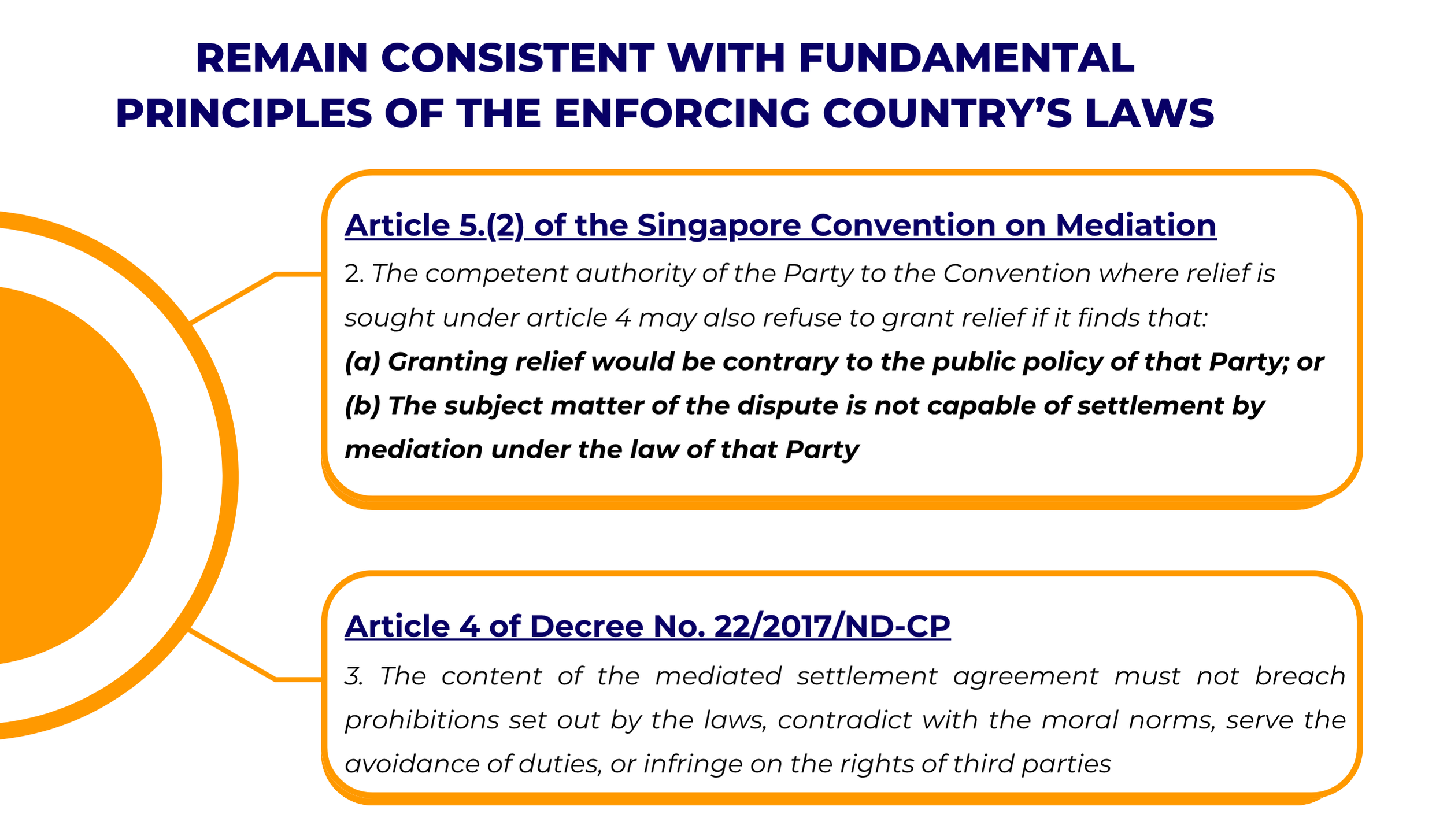
Difference in fundamental principles in the content of the mediated settlement agreement
The content of the mediated settlement agreement is an important and foundational issue that parties must absolutely be mindful of for the recognition of the result. If the content of the agreement is prohibited per the enforcing country’s policy or breach the laws, the agreement shall not be recognized and enforced. Regarding the stipulation, the Singapore Mediation Agreement only provides general pretexts to reject requests. In contrast, Decree No.22/2017/ND-CP, in combination with Article 417 of Civil Procedure Code, specifies the requirements for requests to be accepted.
Overall, when comparing the Singapore Convention on Mediation and Decree No. 22/2017/ND-CP, aside from the mentioned common points, the two documents have several different approaches in relation to dispute resolution via commercial mediation.
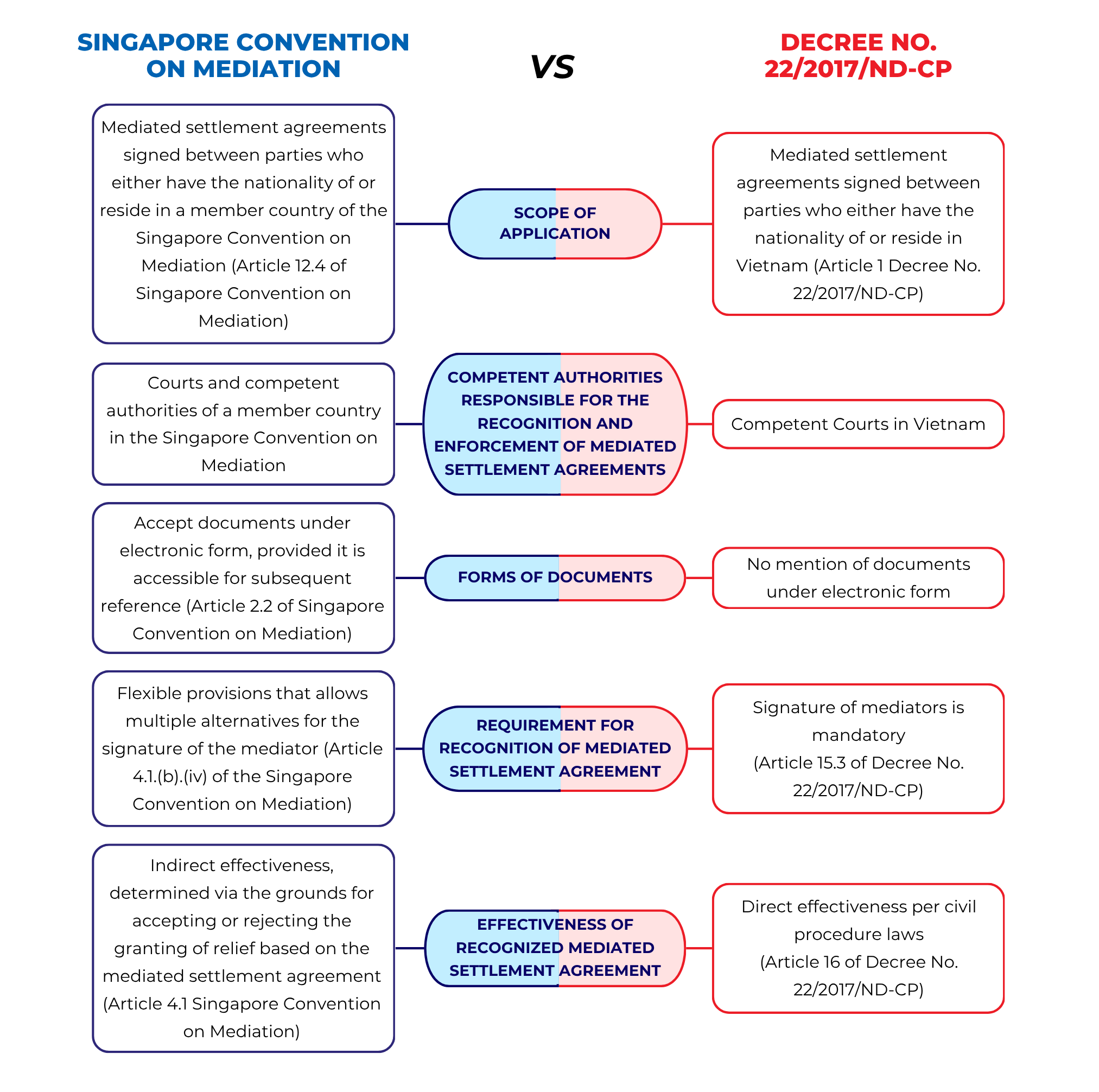
Overview on the differences between the Singapore Convention on Mediation and Decree No. 22/2017/ND-CP
Procedure to request support for enforcement of a mediated settlement agreement at the Singapore Convention
Regarding the enforcement and invocation of the mediated settlement agreement, the Convention entrusts such matters to the member states.
Therefore, in accordance with the general principles listed in Article 3.1 of the Singapore Convention on mediation, the recognition and enforcement of mediated settlement agreements are entrusted to each member party to the Convention.
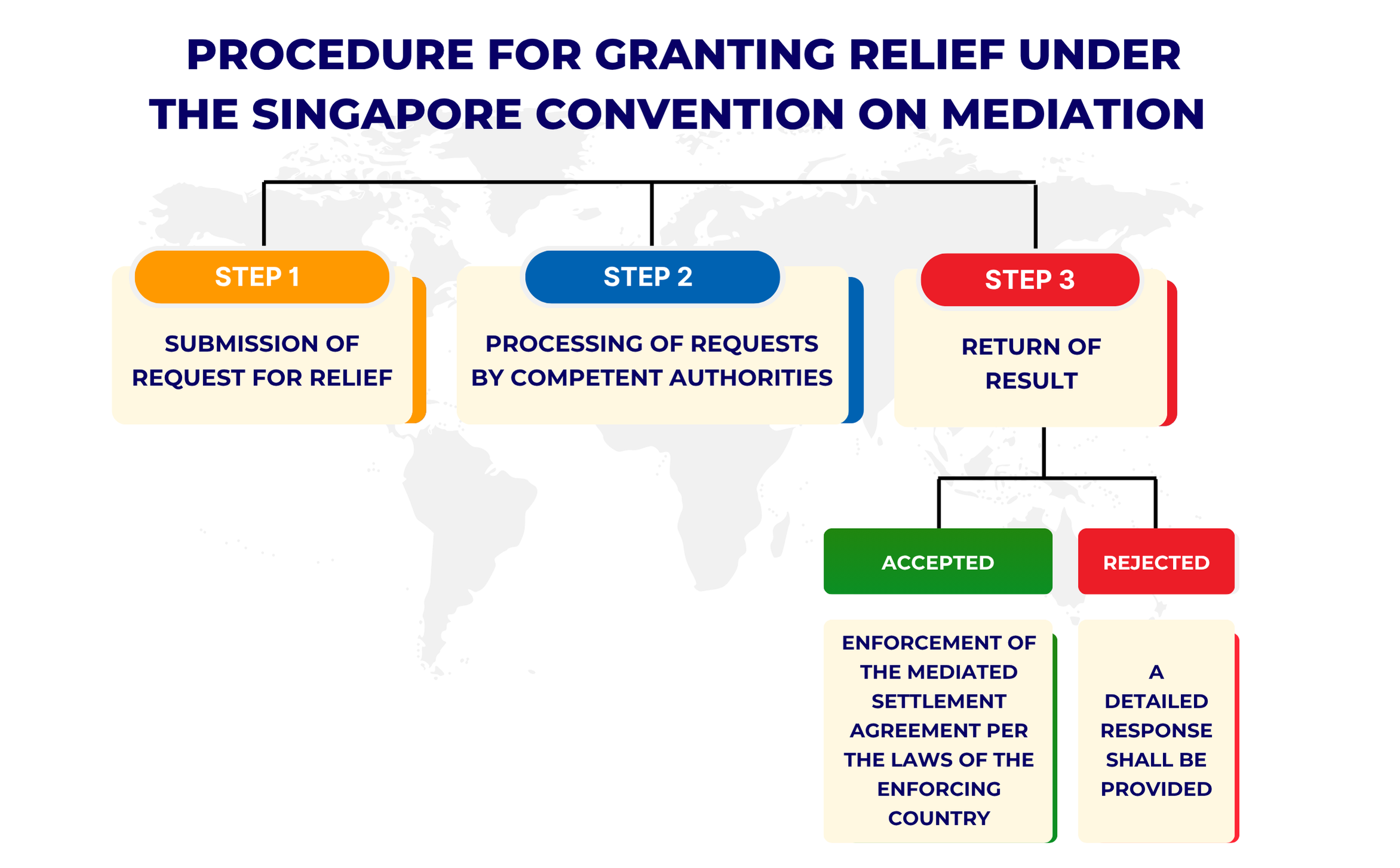
Steps in procedure for granting relief under the Singapore Convention on Mediation
The procedure to request enforcement of the mediated settlement agreement shall be comprised of the following steps:
Step 1: The requester shall submit their request for recognition of the mediated settlement agreement to the competent authorities of the country where the request is made.
The request for relief, in relation to the recognition of the mediation result, must include fundamental information about the mediation agreement and proof that the mediation agreement satisfies the requirements set out in the Singapore Convention on Mediation.
Step 2: The competent authorities are obligated to evaluate the request and give their decisions on the recognition of mediated settlement agreements. The enforceability of mediated settlement agreements is ensured by the state system under the Convention.
Step 3: If the request for support in enforcement of mediated settlement agreements is accepted, the competent authorities shall enforce the agreement in accordance with the laws of their country.
If the request for relief is refused, the competent authorities of the enforcing countries shall give one of the following reasons to refuse granting relief per Article 5 of Singapore Convention on Mediation, namely:
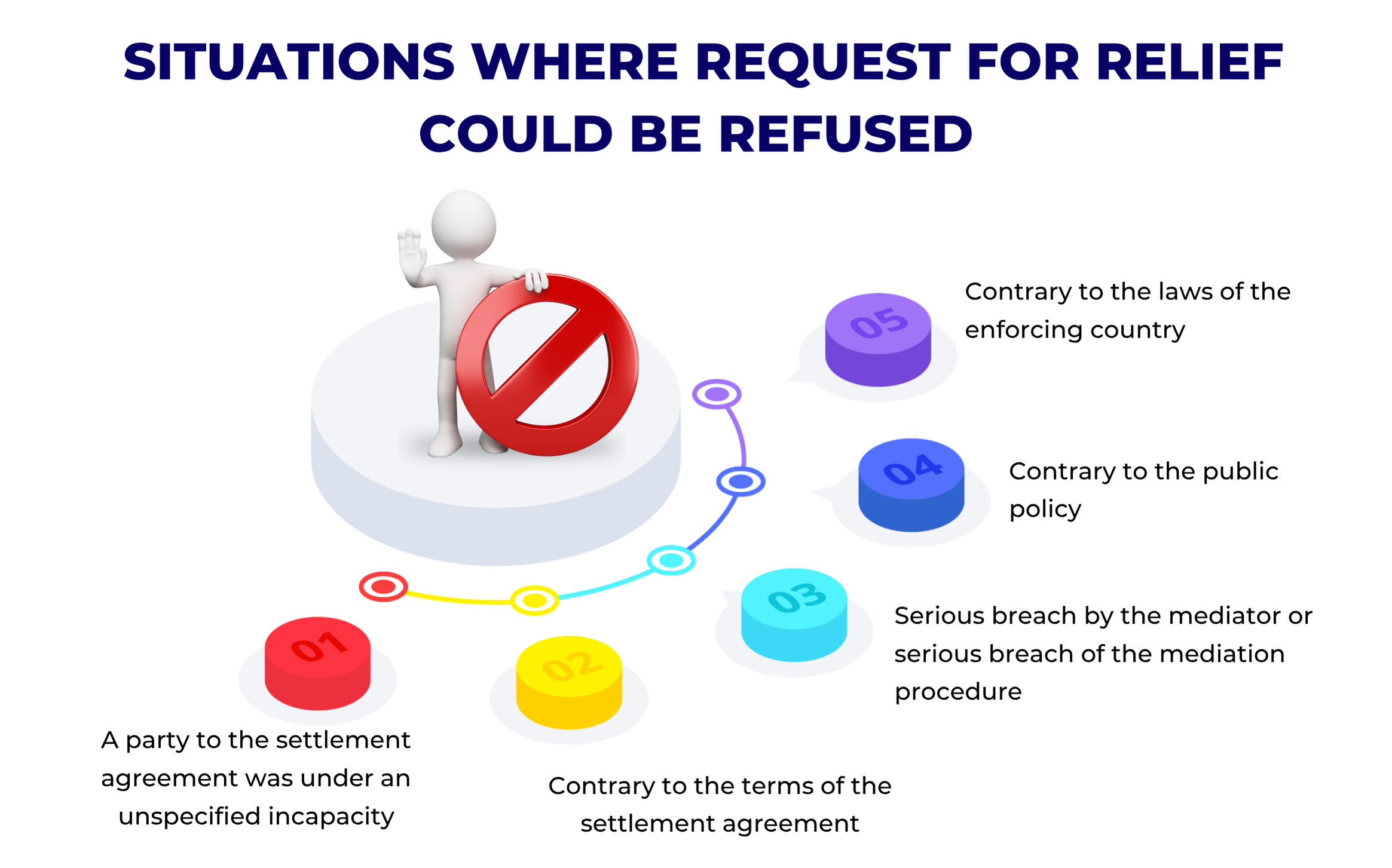
Situations in which a request for enforcement of a mediated settlement agreement could be refused
If the request for support in the enforcement of mediated settlement agreements is rejected, the competent authorities shall provide a response detailing their reasoning.
Conclusion
The Singapore Convention on Mediation is an international legal instrument that is binding on its member states. Member states are obligated to comply with the provisions of the Convention within their respective territories. The Singapore Convention on Mediation also establishes clear and uniform rules for international mediation, covering aspects such as the scope of application, effectiveness, and enforcement. These provisions help make international dispute resolution through mediation more convenient and efficient.
Managed by
 |
Mr. Nguyen Huy Nhat Duy | Associate
Phone: (84) 28 6276 9900 Email: duy.nguyen@cnccounsel.com |
 |
Ms. Nguyen Thi Bao Khanh | Intern
Phone: (84) 28 6276 9900 |
——————————-
To make any contribution, amendment to this article or to request for further support from CNC, please contact:
CNC | A Boutique Property Law Firm
The Sun Avenue, 28 Mai Chi Tho, An Phu Ward, Thu Duc City, Ho Chi Minh City, Vietnam
T: (+84-28) 6276 9900 | Hotline: (+84) 916 545 618
Disclaimers:
This article was prepared and used for the purpose of introducing clients to or updating clients on issues and/or developments of legal perspectives in Vietnam. The information presented in this article does not constitute advice of any kind and may be subject to change without prior notice.
[1] Fundamentals of United Nations Convention on International Settlement Agreements Resulting from Mediation, Democracy and Law Journal (Tạp chí Dân chủ và Pháp luật) (29/20/2021), <https://danchuphapluat.vn/noi-dung-co-ban-cua-cong-uoc-lien-hop-quoc-ve-thoa-thuan-quoc-te-giai-quyet-tranh-chap-thong-qua-hoa-giai> . Accessed on 28/11/2023



